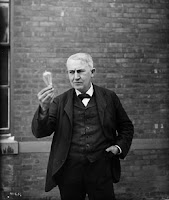When is technology (small "t") no longer Technology (capital "T")?
As I sat down to write this blog post I intended my topic to be about how the simplest and most transparent types of technology could sometimes be the most effective uses of technology in our classrooms. Using a stereo to play a song, or a DVD to show a film, or a simple graphics program to create a listening map are all sited by Bauer (2014) as ways to incorporate technology in regard to "Responding to Music" standards. But then I realized... I don't really, in my heart of hearts, truly consider any of that to be using technology. DVDs are being replaced by Blu-ray, a stereo is as essential in a classroom as paper and pencils, and even the most curmudgeonly of colleagues has at least a working knowledge of how to create decent looking documents using Word or Pages.
All this got me thinking... at what point does technology stop being technology? Even things that don't fall out of favor and usage (*coughcough* eight-tracks *coughcough* fax machines *coughcough* AOL *coughcough*) reach a point that even though they are used daily they just aren't thought of as technology - think landline telephones, the light bulb. A quick Google Images search of "Thomas Edison lightbulb" turns up a whole host of pictures of Edison with his greatest invention (side note.. most of which if recreated would look really silly today... ) but when you really think about it, would you list the light bulb when asked about technology that you know how to use?
 |
| Edison and his greatest invention |
 |
| Johnson looking like a lunatic. |
Even cell phones, which have become mini computers that we store in our pockets, started as technology that is laughable today.
 |
| Zack Morris - Have giant cell phone, will travel. |
... and even I remember a time when anyone who called you while driving for some reason had to start the conversation with "I'm calling you from my car phone!"
 |
| Do I sound more important on this car phone? |
So at what point does technology stop being technology? Who decides? And is it the same for everyone? Douglas Adams (of Hitchhiker's Guide to the Galaxy fame) said:
1) everything that’s already in the world when you’re born is just normal;
2) anything that gets invented between then and before you turn thirty is incredibly exciting and
creative and with any luck you can make a career out of it;
3) anything that gets invented after you’re thirty is against the natural order of things and the
beginning of the end of civilisation as we know it until it’s been around for about ten years when it
gradually turns out to be alright really.
Apply this list to movies, rock music, word processors and mobile phones to work out how old
you are.
So by Adams' definition, what is or isn't technology can be vastly different depending on who is talking. In terms of educational technology, it means that what we as teachers consider to be technology will almost certainly not be the same as what our students consider to be technology. I saw this as an "Age Test" on social media and thought it was funny so I asked my students if they knew what the connection between the two objects was... and they didn't even know what the cassette was never mind how they went together. (sigh.)
References
Bauer, W. I. (2014). Music learning today: Digital pedagogy for creating, performing, and responding to music. New York, NY: Oxford University Press.


I absolutely love your post. I remember being in my college music education lessons and my professor would have us put every piece of "technology" we used in a portion of our lesson plan. I would never want to put things like a stereo or CD onto my plan, but my professor always did. It must be a generational thing, he did not grow up listening to CD's on the stereo and I did. Nice use of the Hitchhikers Guide to the Galaxy, it fits perfectly with this topic.
ReplyDeleteExcellent post. I too sometimes wonder what is considered technology at this point. I think the breakdown is well put, if we grew up with it, we don't consider it to be new. So why would any of our students think anything was out of the ordinary with MP3 player, etc.? (When I'm still just learning to use them, and get really confused when it's not the same iPod that I have).
ReplyDeleteMy sister and I actually just encountered this problem yesterday (and this is where you figure out that we are both over 30). For the life of us we can't figure out how to order our favorite dessert at Dairy Queen. The name has been different for so long now that the high schoolers working at DQ were never alive for the old name. Eventually they figure out what we are talking about, but we have to describe it, because we have NO IDEA what it's called for real. I wish one of those high school kids would just tell us... we're never going to figure it out on our own!